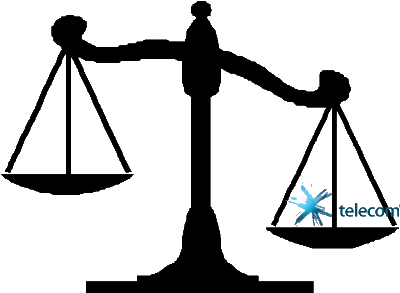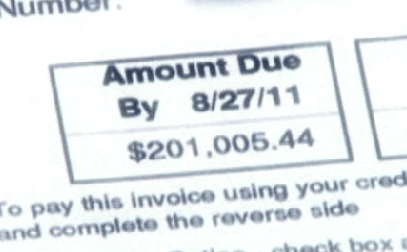 One of the principal components of Internet Overcharging is the so-called “usage meter,” a measurement tool designed to help customers keep track of their usage so they don’t exceed arbitrary usage allowances and face overlimit penalties or speed throttles.
One of the principal components of Internet Overcharging is the so-called “usage meter,” a measurement tool designed to help customers keep track of their usage so they don’t exceed arbitrary usage allowances and face overlimit penalties or speed throttles.
But with no government agency or independent watchdog monitoring the accuracy of the meter, providers can claim any amount of usage they wish, and stick customers with the bill.
Telecom New Zealand is the latest ISP forced to admit its usage meter was wildly inaccurate, with nearly 100,000 accounts impacted by faulty meter measurements between November 2010 and June 2011. At least 47,000 faced punitive measures including substantial overlimit fees or throttled speeds for exceeding usage limits, even though they actually didn’t. Now Telecom has admitted the meter was wrong, it violated the Fair Trading Act in the process, and is refunding $2.7NZ million dollars in overcharges. It was either that or face substantial fines from the Commerce Commission.
Telecom called the error that forced some customers into more expensive plans to avoid additional overlimit fees “an incorrect perception about […] data usage.”
“We’re pleased to have reached a settlement with Telecom and that they have made prompt refunds directly back to the customers who have lost out,” said Stuart Wallace, Commerce Commission Competition Manager. “Telecom brought this issue to our attention as soon as they were made aware by their customers and have co-operated fully with the Commission. Due to Telecom’s immediate admission of a breach of the Fair Trading Act, followed by appropriate compensation to customers, the settlement is the best possible outcome for those customers and avoids potentially lengthy and costly court hearings paid for by taxpayers.”
 It’s the second usage measurement failure announced by the company this month. In a separate move, Telecom agreed to pay $31.6 million to five of its competitors overcharged for wholesale broadband service.
It’s the second usage measurement failure announced by the company this month. In a separate move, Telecom agreed to pay $31.6 million to five of its competitors overcharged for wholesale broadband service.
When technically-savvy customers realize they are being billed for non-existent usage and the media takes an interest, providers eventually disclose their mistaken measurement tools.
“Customers are expected to keep these ISP’s honest,” says Stuart Littlejohn, a Stop the Cap! reader in Wellington. “ISP’s never suggest their meters are anything except accurate until they are caught with their fingers on the scale, and always in their favor.”
Littlejohn has already received a refund from Telecom for illegitimate overcharges he incurred earlier this year.
“It was an absolute nightmare,” he shares. “We thought someone hacked our wireless network or someone in the home was lying about their usage, all theories encouraged by Telecom employees who pointed the finger at everyone but themselves.”
Littlejohn says after Telecom granted one credit as a “goodwill gesture,” subsequent overcharges that went unexplained were his problem, not theirs.
“After the first credit, everything else is your fault,” he says.
Littlejohn caught the company red-handed when storm damage disrupted his service for nearly a week, and Telecom’s usage meter recorded 22GB of usage on his down-and-out service anyway.
“They ultimately couldn’t argue with themselves, but they tried at first,” he says. “Then I told them to call the department responsible for repairing my service and they quickly learned the line they said used 22GB was out of service at the time the usage was supposed to occur.”
“Without that, they would have probably insisted I still owed them for that ‘usage.'”
Littlejohn wasn’t alone. Other overbilled customers appealed their case to the New Zealand Herald last June, and two weeks later, Telecom admitted their usage measurement tool was faulty. But by then, customers were already paying for the erroneous charges:
The Herald has received detailed internet usage logs from two Telecom customers – one in Dunedin and the other in New Plymouth – which show over-counting broadband downloads, in one period by as much as 139 per cent. Both have raised the matter repeatedly with Telecom, but have yet to get an explanation.
“We showed Telecom five days of data as early as February 14,” says director Mark Peisker of Dunedin’s CueClub. “There was massive variance between our data and that reported by the Telecom usage meter. I said to them: ‘Your counting has very little to do with what comes down my line to me’.”
CueClub’s data taken from its two internet routers shows an average of 62 per cent over-counting during a three month period – the worst month being May when Telecom counted an extra 118.24 gigabytes (GB) of usage amounting to $203.97 in overcharging.
“They’re crooks, plain and simple, and only when they were caught did they admit their mistakes, and the only ‘penalty’ they are paying is refunding their ill-gotten gains,” Littlejohn says. “Where is the substantial fine to send a message stealing from your customers is wrong? A strong fine would tell Telecom they made a costly mistake not worth repeating.”


 Subscribe
Subscribe






